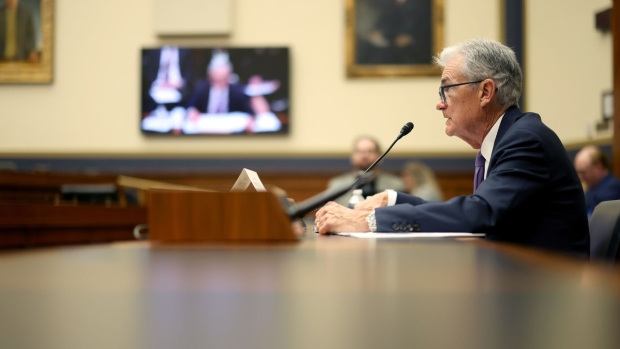Mar 6, 2024
Fed’s Powell Says Significant Changes to Bank Capital Plan Likely
, Bloomberg News

(Bloomberg) -- Federal Reserve Chair Jerome Powell said that US regulators are likely to significantly change their plan to require large lenders to hold more capital — a move that would mark a major win for Wall Street giants.
“I do expect there will be broad and material changes to the proposal,” Powell told lawmakers on the House Financial Services Committee on Wednesday. He added that no decisions had been made, but that it was possible regulators could scrap the plan floated last July and propose a new version. “It’s a very plausible option,” he said.
The Fed, Federal Deposit Insurance Corp. and the Office of the Comptroller of the Currency proposed last July a sweeping plan that would boost by about 19% how much capital the US’s eight largest banks have to hold. Industry groups have waged a fierce lobbying campaign against the plan, arguing that it will make them less competitive — and home and business loans less affordable.
Read More: Wall Street Again Blasts US Capital Rule in Bid to Sway Fed
Republican lawmakers and at least one Fed governor urged the Fed to scrap its proposal and start over. Meanwhile, Michael Barr, who oversees bank supervision for the Fed, has cast the proposed changes as a way to ensure lenders can withstand crises.
Powell’s comments were immediately cheered by banking-industry executives. Kevin Fromer, who leads the Financial Services Forum, said that his trade group was “encouraged” by the remarks. “Broad and material changes are needed to the proposal,” he said. “We continue to believe that a re-proposal is the best approach.”
The proposal, which was tied to the Basel III international overhaul that started more than a decade ago, also has been billed by supporters as a fix for some of the issues exposed by the failures of Silicon Valley Bank and Signature Bank.
Long-term Debt
In his testimony, the central bank chief didn’t specify which parts of regulators’ plans were most likely to be changed. The industry has argued that July proposal overstates how much cushion lenders would need to cover unexpected hits to business lines such as mortgage lending, operational and trading activities, and fee-based services.
Read More: Why Bigger ‘Capital Cushions’ Have Banks On Edge: QuickTake
Powell, in addition to Barr, and other senior Fed officials will need to vote on a final plan before the rules can take hold. As proposed last July, the plan amounts to one of the biggest regulatory overhauls for major banks since the global financial crisis.
During the hearing, some lawmakers peppered the central bank chief with questions about whether the Fed has appropriately weighed the costs of the capital changes, and how they could interact with other ambitious reform plans that have been recently issued.
In response, Powell said the Fed is weighing how a re-proposal of the capital plan would impact other proposed bank regulations. “That’s the question we’d be asking ourselves, what would be the implication for other rules, including the long-term debt,” said Powell, adding that the Fed would deliberate the matter.
Advocates for tougher rules immediately lashed out at the notion of scrapping the July plan to re-propose a new version.
“Powell promised the Senate when he was reconfirmed to the Fed that the vice chair of supervision has the lead on regulatory issues, which is the law, after all,” said Carter Dougherty, a spokesperson at Americans for Financial Reform, a Washington-based coalition of consumer and investor advocates.
Possible Changes
Barr has previously said that regulators would consider making changes to the plan. However, he hasn’t given a firm date for when the final rule would be released.
Barr has also said that much of the increase in capital set aside would stem from trading and activities besides lending and pushed back on criticism that regulators hadn’t done enough to justify the proposed changes.
The heads of Wall Street’s biggest banks were in attack mode when they testified before the Senate Banking Committee in December. One by one, executives confidently told lawmakers their institutions were safe and that everyday Americans would ultimately pay the price if tougher rules are enacted.
“Your local affordable housing, or the Montana pension plan,” JPMorgan Chase & Co. Chief Executive Officer Jamie Dimon said at the time. “All of these things will trickle through, become more expensive.” The industry’s arguments have also been spilling out for months in television and radio advertisements.
The political stakes are also high with November’s elections looming. A consolidation of power by Republicans, who have been generally receptive to the industry’s arguments, would further hamstring the effort.
(Updates with Powell comments in 10th paragraph)
©2024 Bloomberg L.P.

